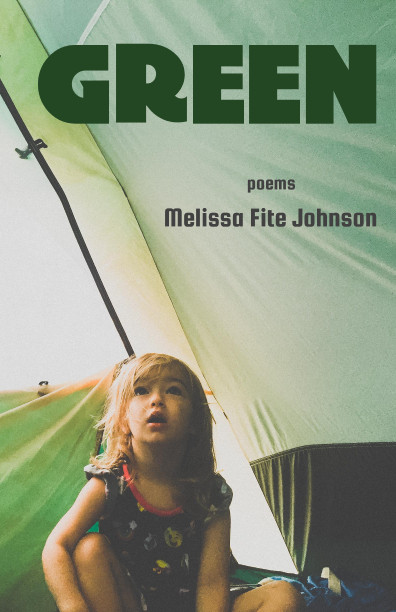
REVIEW BY GABINO IGLESIAS
—
Melissa Fite Johnson’s Green is a box of memories that also contains a few bridges. Yes, I said bridges. The first one is between now and whenever the things she talks about—the death of her father, her running away at five years old, breaking her leg, a trip to the fertility clinic—happened. The second is between poetry and music. These are poems that have a unique rhythm, and undeniable musicality, but I mean more than that; these are poems that have open conversations with songs, most of which readers will know. The last bridge is between reality and the world Johnson’s filter creates. She was once sixteen, but she can be sixteen again here as she visits her past self or she can bring her father to the page despite the fact that he passed away in 1998. Every one of these bridges is worth crossing.
Poetry that tells stories has always been my favorite kind, and Green is full of stories. Some have a hint of comedy, some are memories shaped into poetry by words, and some are slices of Johnson’s biography presented without filter. Every line about her father, for example, cuts you to the marrow. “The Immediacy” is a perfect example:
Once my father wanted yogurt?
but couldn’t remember the word.?
Once he tried to carry his own cereal,
brace the bowl’s lip against his cane handle,
and my mother came home to flakes
crusted to the kitchen floor. When he
mouthed Elden again and again, I guessed
my brother had a new girlfriend, Ellen, but
it was the name of his dead uncle.?
So what? I asked, then left the room.
The day my father died,?
I smelled the cologne-tinged?
rubber handle of his cane, held it tight
in my hand, pretended it was his hand.
The say geniuses are those who can explain something complicated in a way that it’s easy to understand. The poetic version of that probably has to do with a poet’s ability to bring something to the page in a way that you understand it, but only the best of them can me you both understand and feel. Johnson belongs to this second group. There are poems here so full of emotion that they stick with you even after you’re done reading. There’s sadness and pain, but both are presented in ways that they become palpable, capable of jumping from the page and touching you with their painful straightforwardness. Just read “The Woman and the Wolf”:
He strangled little sounds from me
in his doorway. Later?
he called the word strangle
dramatic. You could breathe fine.
Hand over my mouth, he shushed
into my ear. Later he said,?
You can’t rape your girlfriend.?
I lay awake while he slept.
Easter morning I cried?
in church, quietly?
so my mother couldn’t hear.
Another bowed chin in a pew.
Sometimes I imagine wolves?
as wounded birds. From a distance,
they’re not so different, the howling
head, a wing puncturing the sky.
Johnson visits herself in the past and sees herself in the future. She imagines other realities while tied to this one. Throughout all of it, she chronicles, and the result of that is a fantastic collection that demands to be devoured first and then read slowly, savoring each trip in time regardless of the darkness that sometimes is waiting there.
—
Gabino Iglesias is a writer, editor, literary critic, and professor living in Austin, TX. He is the author of ZERO SAINTS and COYOTE SONGS. You can find him on Twitter at @Gabino_Iglesias.
![[PANK]](https://pankmagazine.com/wp-content/themes/pank/assets/images/pank-logo-large.png)
